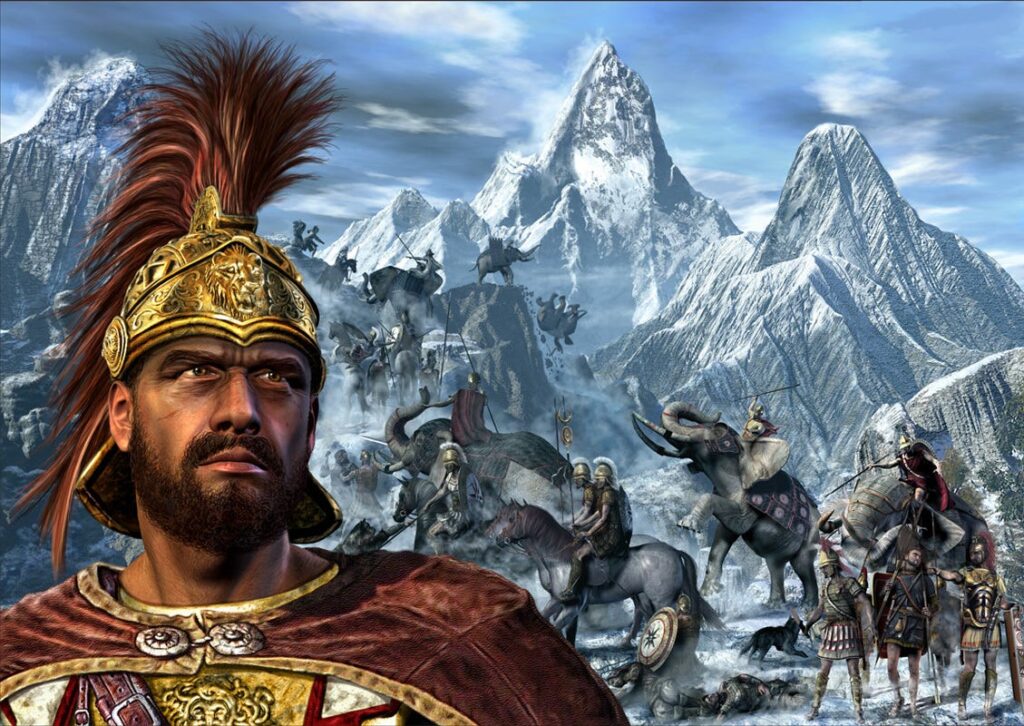Hannibal Barca was a Carthaginian general and statesman, popularly known for commanding the forces of Carthage in their battle against the Roman Republic during the Second Punic War. He is considered by many one of the greatest military tacticians and Military generals of antiquity (ancient history), alongside Philip of Macedon, Alexander the Great, Leonidas, Julius Caesar, Scipio Africanus, and Pyrrhus. Hannibal during his consistent battle against the Roman Empire, became prominent for staging one of the most legendary attacks in the history of military warfare. Hannibal tactics against the roman empire were so impressive that they are still studied and used in the present day.
Early Life
Hannibal Barca was the son of Hamilcar Barca, a leading Carthaginian general during the First Punic War. He was born in what is present-day northern Tunisia, one of the colonies that make up Carthage. Hannibal lived during a period of great tension in the Mediterranean Basin, triggered by the emergence of the Roman Republic as a great power with its defeat of Carthage in the First Punic War.
After Carthage’s defeat in the First Punic War, Hannibal was taken to Spain by his father and at an early age was made to swear eternal hostility to Rome. According to the account, Hannibal was begging his father to take him to an overseas war, Who then took him up and brought him to a sacrificial chamber. Hamilcar held Hannibal over the fire roaring in the chamber and made him swear that he would never be a friend of Rome.
In 221 BC, following the death of his father and his brother-in-law, Hasdrubal, Hannibal was proclaimed commander-in-chief by the army and confirmed in his appointment by the Carthaginian government. After he assumed command, Hannibal spent two years consolidating his holdings and completing the conquest of Hispania, which his father had begun.
Hannibal conquered various Spanish tribes, including the Olcades, the Vaccaei, and the Carpetani, and began using Spain as his base of operations. Rome, fearing the growing strength of Hannibal made an alliance with the city of Saguntum, and claimed the city as its protectorate. Hannibal who was already planning an attack on Rome laid siege to the city, sparking the Second Punic War.
Second Punic War (218 to 201 BC)
Hannibal Barca invaded Italy by crossing the Alps with North African war elephants. The elephants, functioning as tanks used their bulk to smash through enemy lines. Hannibal’s invasion stunned the Romans. In his first few years, he won a succession of victories at the Battle of the Trebia, Lake Trasimene, and Cannae, inflicting heavy losses on the Romans.
During the Battle of Cannae by drawing back the endangered center of his line to form a pocket. The oncoming Romans were trapped when his resilient forces swept around their flanks and enveloped them. That maneuver remains among the most celebrated in military history. The Battle of Cannae is considered one of the deadliest single days of combat ever fought by a Western army.
Hannibal was distinguished for his ability to determine both his and his opponent’s respective strengths and weaknesses, and to plan battles accordingly. His strategic objective was to demoralize Rome’s Italian allies and cause them to defect. With this, he was able to conquer and ally with several Italian cities that were previously allied to Rome, occupying most of southern Italy for 15 years.
Despite Hannibal’s Impressive strategies, he was forced to abandon Italy thanks to the Roman General, Scipio Africanus. Scipion avoided directly engaging Hannibal, instead waging a war of attrition, waging an attack on Spain. Carthaginian defeats in Hispania prevented Hannibal from being reinforced in Italy, and he was unable to win a decisive victory.
Scipio’s counter-invasion of North Africa forced Hannibal to return to Carthage. The two met in the climactic Battle of Zama in 202 B.C. Hannibal was defeated at the Battle of Zama, ending the war in a Roman victory. Carthage ceded to Rome all its territories outside Africa and disbanded its army.
Exile and death of Hannibal
After the war, Hannibal Barca successfully ran for the office of safety. He enacted political and financial reforms to enable the payment of the war indemnity imposed by Rome; however, those reforms were unpopular with members of the Carthaginian aristocracy. Also, the Romans, alarmed by Carthage’s renewed prosperity and suspicious that Hannibal had been in contact with Antiochus III of the Seleucid Empire, sent a delegation to Carthage alleging that Hannibal was helping an enemy of Rome.
Aware of these circumstances, Hannibal fled into voluntary exile before the Romans could demand his surrender. He journeyed first to Tyre, and then to Antioch before he finally reached Ephesus, where he was honorably received. During this time, he acted as a military advisor to Antiochus III the Great in his war against Rome. Antiochus was defeated on land at Magnesia in 190, and one of the terms demanded of him by the Romans was that Hannibal should be surrendered.
Suspicious that Antiochus was prepared to surrender him to the Romans, Hannibal fled and sought refuge with Prusias I of Bithynia, who was engaged in warfare with Rome’s ally, King Eumenes II of Pergamon. He served Prusias in that war, and, in one of the victories he gained over Eumenes at sea, it is said that he threw baskets of snakes into the enemy vessels in one of the earliest documented examples of biological warfare.
The Romans threatened Bithynia into giving up Hannibal. Hannibal, expecting treachery from Bithynia, sent out his last faithful servant to check all the secret exits from his fortress. The servant reported back that hostile unknown guards stood at every exit. Knowing that he had been betrayed and was unable to escape, Hannibal poisoned himself in a final act of defiance against the Romans.
The Legacy of Hannibal Barca
Hannibal Barca is generally regarded as one of the best military strategists and tacticians of all time, the double envelopment at Cannae an enduring legacy of tactical brilliance. According to Appian, several years after the Second Punic War, Hannibal served as a political advisor in the Seleucid Kingdom and Scipio arrived there on a diplomatic mission from Rome.
Even the Roman chroniclers acknowledged Hannibal’s supreme military leadership, writing that “he never required others to do what he could not and would not do himself”. They considered him the greatest enemy Rome had ever faced. The Romans even built statues of the Hanibal in the streets of Rome to advertise their defeat of such a worthy adversary.
Hannibal caused great distress to many in Roman society. He became such a figure of terror that, whenever disaster threatened, Romans would exclaim “Hannibal ad portas” (“Hannibal is at the gates!”) to emphasize the gravity of the emergency, a phrase still used in modern languages. Military academies all over the world continue to study Hannibal’s exploits.






